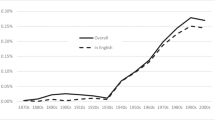Abstract
Serving as an introduction to the essays in this volume, we put forward an intellectual hardcore for a shared research agenda between Austrian and Virginia political economy. This research agenda rests on three pillars: exchange, rules, and social cooperation. Each of these pillars forms the distinctive flavor of Austrian and Virginian political economy with respect to theoretical approach, types and applications of empirics, and even to normative questions. Our essay explores the meaning of these pillars with respect to the broader study of political economy, as well as the intellectual superstructure of each respective school.
Similar content being viewed by others
Notes
Stringham (2005) presents a re-evaluation of and challenge to this literature by a younger generation of Austrian and public choice inspired economists.
Other participants included Philip Bagus, Tony Carilli, Daniel D’Amico, Joshua Hall, Jeremy Horpedahl, Sanford Ikeda, Peter Lewin, Roderick Long, Edward Lopez, Jochen Runde, Daniel Smith, Richard Wagner, and Tyler Watts.
References
Brennan, G., & Buchanan, J. M. (1980). The Power to Tax. Cambridge: Cambridge University Press.
Brennan, G., & Buchanan, J. M. (1985). The Reason of Rules. Cambridge: Cambridge University Press.
Buchanan, J. M. (1954). Social choice, democracy, and free markets. Journal of Political Economy, 62, 114–123.
Buchanan, J. M. (1958). Public principles of public debt. Homewood: Irwin.
Buchanan, J. M. (1964). What should economists do? Southern Economic Journal, 30, 213–222.
Buchanan, J. M. (1967). Public finance in democratic process. Chapel Hill: University of North Carolina Press.
Buchanan, J. M. (1979) “Natural and Artifactual Man” In Buchanan JM What Should Economists Do? Liberty Fund, Indianapolis, pp 93–112.
Buchanan, J. M. (1980). Rent seeking and profit seeking. In J. M. Buchanan, R. D. Tollison, & G. Tullock (Eds.), Toward a theory of the rent-seeking society (pp. 3–15). College Station: Texas A&M University.
Buchanan, J. M. (1982). Order defined in the process of its emergence. Literature in Liberty, 5, 5.
Buchanan, J. M. (1986). Prize Lecture: The Constitution of Economic Policy" Nobelprize.org: Nobel Media AB, retrieved September 21, 2013. http://www.nobelprize.org/nobel_prizes/economic-sciences/laureates/1986/buchanan-lecture.html
Buchanan, J. M., & Congleton, R. D., (1998) Politics by Principle, not Interest. Cambridge: Cambridge University Press.
Buchanan, J. M., & Tullock, G. (1962). The calculus of consent. Ann Arbor: University of Michigan.
Buchanan, J. M., & Wagner, R. E. (1977). Democracy in deficit. New York: Academic.
Hayek, F. A. (1944). The road to serfdom. London: Routledge.
Hayek, F. A. (1945). The use of knowledge in society. American Economic Review, 35(4), 519–530.
Hayek, F. A. (1960). The Constitution of Liberty. Chicago: Chicago University Press.
Hayek, F. A. (1973). Law, Legislation, and Liberty, Vol 1: Rules and Order. Chicago: Chicago University Press.
Hazlitt, H. (1964). The foundations of morality. New York: D. Van Norstrand Company.
Kirzner, I. M. (1973). Competition and Entrepreneurship. Chicago: Chicago University Press.
Kirzner, I. M. (1997). Entrepreneurial discovery and the competitive market process: an Austrian approach. Journal of Economic Literature, 35(1), 60–85.
Kirzner, I. M. (2000). “Coordination as a Criterion of Economic ‘Goodness’.” In Kirzner IM The Driving Force of the Market. Routledge, London, pp 132–148.
Kohn, M. (2004). Value and Exchange. Cato Journal, 24(3), 303–339.
Kohn, M. (2007). The Exchange Paradigm: Where to Now? Review of Austrian Economics, 20, 201–203.
Lachmann, L. M. (1971). The legacy of Max Weber. Berkeley: Glenddessary Press.
Menger, C. (1871 [1994]). Principles of Economics. Libertarian Press: Grove City, PA.
Menger, C. (1883 [1985]). Investigations into the Method of the Social Sciences. New York: New York Univeristy.
North, D. C. (1990). Institutions, Institutional Change and Economic Performance. Cambridge: Cambridge University Press.
O’Driscoll, G. P. (1977). Economics as a coordination problem. Kansas City: Sheed, Andrews, Mcmeel.
Roberts, P. C. (1971). Alienation and the soviety economy. Albuquerque: University of New Mexico Press.
Stringham, E. (Ed.). (2005). Anarchy, state, and public choice. Cheltenham: Edward Elgar.
Tullock, G. (1965). The Politics of Bureaucracy. Washington DC: Public Affairs Press
Tullock, G. (Ed.). (1972). Explorations in the theory of anarchy. Blacksburg: Center for the Study of Public Choice.
Tullock, G. (Ed.). (1974a). Further explorations in the theory of anarchy. Blacksburg: Virginia Polytechnic Institute and State University Press.
Tullock, G. (1974b). The social dilemma: The economics of War and revolution. Blacksburg: Virginia Polytechnic Institute and State University Press.
von Mises, L. (1920). Economic calculation in the socialist commonwealth. In F. A. Hayek (Ed.), Collectivist economic planning (pp. 87–130). London: Routledge.
von Mises, L. (1944). Bureaucracy. New Haven: Yale.
von Mises, L. (1949). Human action. New Haven: Yale.
Wagner, R. E. (2004). Public choice as an academic enterprise: Charlottesville, Blacksburg, and Fairfax retrospectively viewed. American Journal of Economics and Sociology, 63(1), 55–74.
Wagner, R. E. (2007a). Fiscal sociology and the theory of public finance. Cheltenham: Edward Elgar.
Wagner, R. E. (2007b). Value and exchange: two windows for economic theorizing. Review of Austrian Economics, 20, 97–103.
Wagner, R. E. (2012). Deficits, debt, and democracy. Cheltenham: Edward Elgar.
Yeager, L. B. (2002). Ethics as a social science. Cheltenham: Edward Elgar.
Author information
Authors and Affiliations
Corresponding author
Rights and permissions
About this article
Cite this article
Lea, G.S., Martin, A.G. From Vienna to Virginia: Exchange, rules, and social cooperation an introduction to the symposium. Rev Austrian Econ 27, 1–9 (2014). https://doi.org/10.1007/s11138-013-0240-x
Published:
Issue Date:
DOI: https://doi.org/10.1007/s11138-013-0240-x




